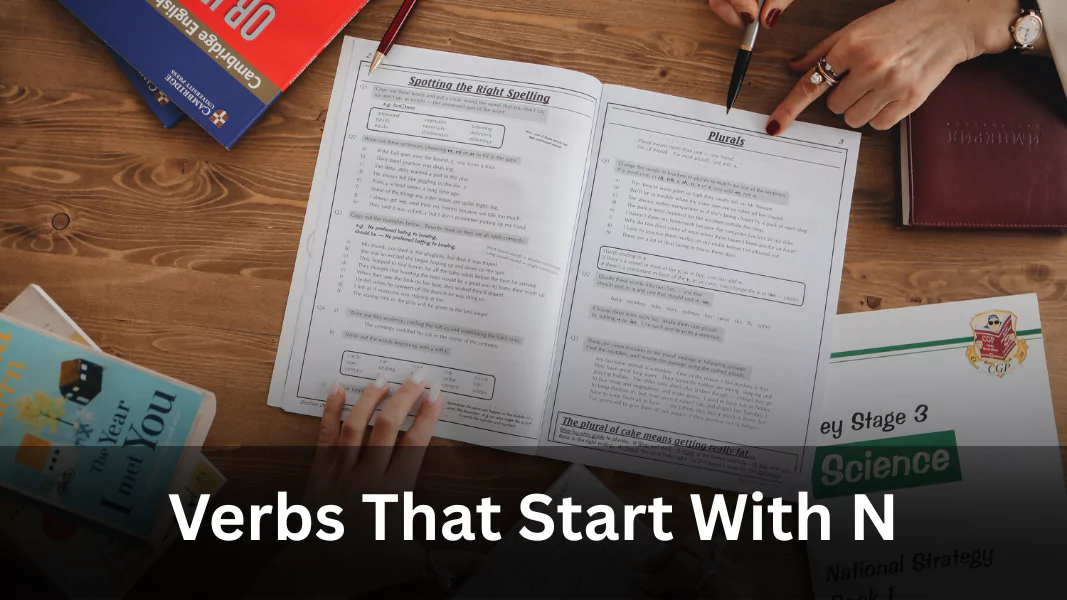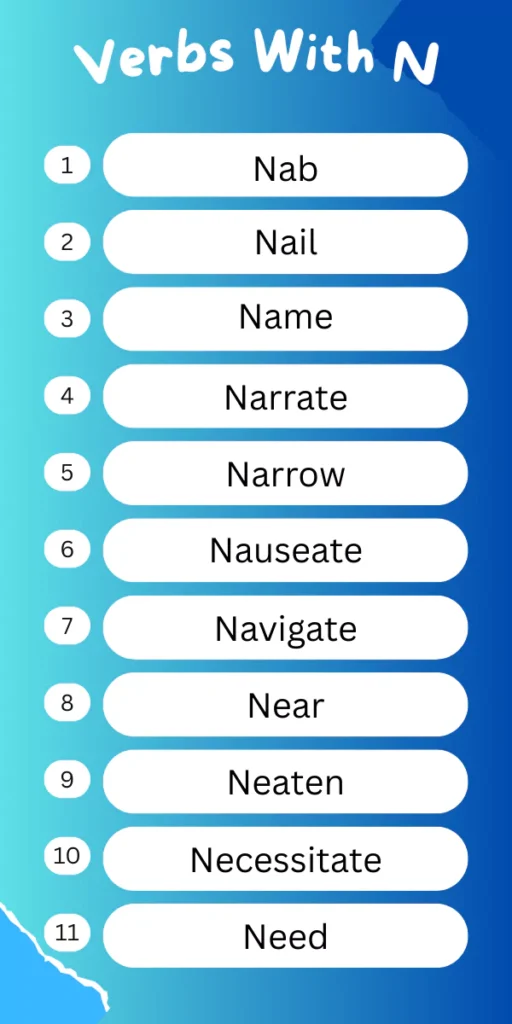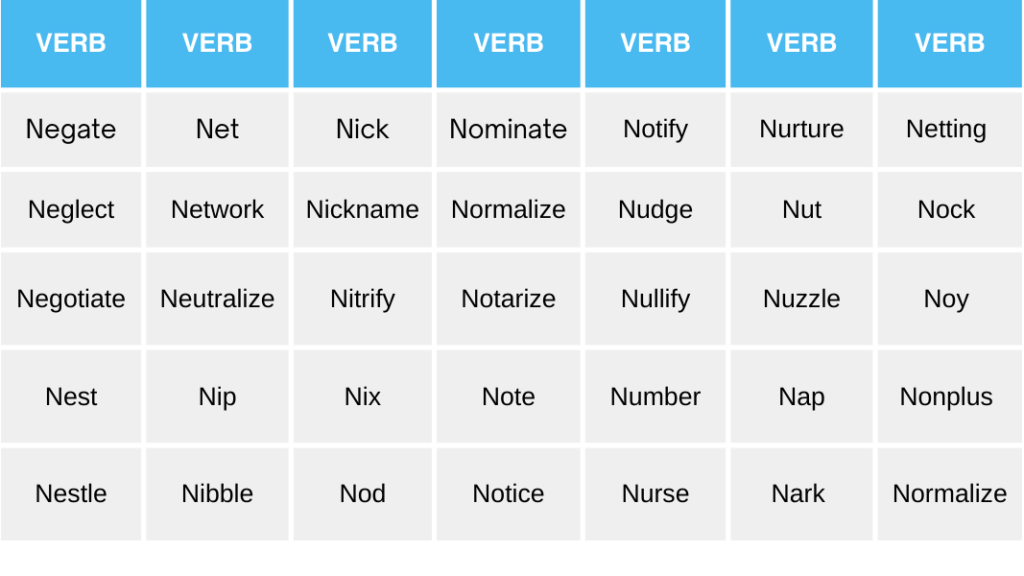Verbs That Start With N | List of N-Verbs with Meanings & Examples

Verbs are the heartbeat of language because they bring movement, life, and clarity to our sentences. Among them, verbs that start with the letter N carry a special charm. From nourish and navigate to negotiate and nurture, these words add energy, positivity, and precision to communication. Whether you’re a student expanding vocabulary, a writer searching for expressive action words, or a parent teaching kids new terms, learning verbs beginning with N can be both fun and impactful.
List of Verbs That Start With N
Verbs that begin with N are versatile and powerful, ranging from everyday words like need and notice to more impactful ones like nourish, negotiate, and navigate. These verbs describe actions, feelings, and processes that bring richness to both spoken and written language. Whether you want to express care (nurture), direction (navigate), or communication (narrate), N-verbs offer plenty of choices. Below, you’ll find a curated list of verbs beginning with N, complete with meanings and examples, to help you strengthen your vocabulary and use them confidently in sentences.

Common Verbs Starting With N
- Name – to give a title or identify.
Example: They decided to name the puppy Max. - Need – to require something.
Example: I need more time to finish the project. - Notice – to observe or become aware of.
Example: Did you notice the new painting on the wall? - Narrate – to tell a story or describe events.
Example: The guide will narrate the history of the castle. - Neglect – to fail to care for properly.
Example: He neglected his health for years. - Nod – to move the head up and down as a sign.
Example: She nodded in agreement. - Nag – to repeatedly complain or find fault.
Example: Stop nagging about the dishes. - Nest – to build or settle in a safe place.
Example: Birds nest in tall trees during spring. - Navigate – to plan or follow a route.
Example: He skillfully navigated the boat through the river. - Nudge – to push slightly, usually with the elbow.
Example: She nudged him to look at the funny sign. - Number – to assign numbers or count.
Example: The seats are numbered for easy reference. - Note – to observe or record information.
Example: Please note the deadline is tomorrow. - Nominate – to propose someone for a position.
Example: She was nominated for class president. - Neutralize – to counteract or make harmless.
Example: The soldiers worked to neutralize the threat. - Nurture – to care for and support growth.
Example: Parents should nurture their children’s talents.
Positive Verbs Starting With N
| Verb | Meaning | Example |
|---|---|---|
| Nourish | to provide food or care | Good friends nourish the soul. |
| Nurture | to encourage development | Teachers nurture creativity in students. |
| Navigate | to guide successfully | She navigated her career with determination. |
| Negotiate | to reach a fair agreement | They negotiated peace between the two sides. |
| Nominate | to put someone forward for honor | He was nominated for an award. |
| Notice | to recognize and appreciate | She noticed his hard work. |
| Normalize | to bring to a balanced or healthy state | The therapy helped normalize her sleep patterns. |
| Network | to build helpful connections | She networked at the conference to meet new clients. |
| Nod | to express agreement or support | Everyone nodded in approval. |
| Narrate | to share a story or knowledge | He narrated his inspiring journey. |
| Nurture | to provide emotional support | She nurtured her team’s confidence. |
| Neutralize | to balance out negativity | Humor can neutralize tense situations. |
| Notice | to show appreciation or awareness | He was happy she noticed his efforts. |
| Nominate | to recognize someone’s value | The committee nominated her for leadership. |
| Normalize | to make life easier and more natural | The teacher worked to normalize online learning. |
Action Verbs Starting With N
- Nag – to persistently annoy or scold.
Example: He kept nagging about the rules. - Nod – to signal by moving the head.
Example: She nodded politely at the guest. - Nip – to pinch or bite lightly.
Example: The dog tried to nip at his shoe. - Nudge – to push slightly.
Example: He nudged the chair closer. - Nest – to settle or build a home.
Example: The bird nested in the garden. - Nab – to catch or seize quickly.
Example: The police nabbed the thief. - Narrate – to describe events.
Example: She narrated the story with passion. - Navigate – to move through or find direction.
Example: He navigated through the crowd. - Narrow – to make something smaller in width.
Example: The road narrowed after the bridge. - Neglect – to ignore or fail to care for.
Example: He neglected his homework. - Need – to require something essential.
Example: I need a glass of water. - Neutralize – to counteract or cancel out.
Example: The chemical neutralized the acid. - Notice – to become aware of something.
Example: Did you notice the mistake? - Nominate – to propose for an honor or role.
Example: They nominated her for team leader. - Nuzzle – to gently rub or cuddle with the nose.
Example: The cat nuzzled against my hand.
Regular Verbs That Start With N
- Name – Named
Example: They named their daughter Lily. - Nod – Nodded
Example: He nodded to show agreement. - Nag – Nagged
Example: She nagged him about his diet. - Nail – Nailed
Example: He nailed the board to the wall. - Narrow – Narrowed
Example: The road narrowed ahead. - Narrate – Narrated
Example: She narrated the documentary. - Nurture – Nurtured
Example: The coach nurtured young talent. - Need – Needed
Example: I needed help with my homework. - Notice – Noticed
Example: She noticed the mistake quickly. - Nudge – Nudged
Example: He nudged the door open. - Nominate – Nominated
Example: She was nominated for the award. - Network – Networked
Example: He networked at the seminar. - Nest – Nested
Example: The birds nested in the oak tree. - Nuzzle – Nuzzled
Example: The baby nuzzled into her shoulder. - Normalize – Normalized
Example: Therapy normalized his sleeping pattern.
Irregular Verbs Starting With N
- Nip – Nipped / Nipt (past forms vary)
Example: The frost nipt the flowers last night. - *Nod – Nod / Nodded (archaic irregular past: “nodd” in Old English)
Example: He nodded to greet her. - Nay-say – Nay-said
Example: Many critics nay–said the project at first. - *Nay – Nay / Nayen (obsolete past “nayed” or “nayen”)
Example: He nayen the proposal (archaic). - Naysay – Naysaid
Example: She often naysaid his ideas. - Nide – Nade (obsolete) – to nest together.
Example: The hens nade in spring (archaic). - Nesh – Nesh / Neshed (dialect) – to weaken or make soft.
Example: Frost has neshed the ground. - Nim – Nam (Old English) – to take or seize.
Example: He nam the treasure quickly. - Nesh – Neshen (Middle English irregular form).
Example: The harsh wind neshen the leaves. - Nide – Nidden (rare past participle).
Example: Birds nidden in the hollow. - Nay-swear – Nay-swore.
Example: He nay-swore the oath. - Nay-speak – Nay-spoke.
Example: They nay-spoke against the king. - Nay-choose – Nay-chose.
Example: He nay-chose but to obey. - Nay-give – Nay-gave.
Example: The soldier nay-gave his weapon. - Nay-thrive – Nay-throve.
Example: The crops nay-throve in drought.
Phrasal Verbs Starting With N
| Verb | Meaning | Example |
|---|---|---|
| Narrow down | to reduce or refine options | We need to narrow down the choices. |
| Nod off | to fall asleep unintentionally | He nodded off during the lecture. |
| Nail down | to finalize or secure | Let’s nail down the details of the plan. |
| Nose around | to search or snoop | She kept nosing around my desk. |
| Note down | to record in writing | Please note down the instructions. |
| Nip out | to leave briefly | I’ll nip out to grab a coffee. |
| Nip off | to go away quickly | He nipped off before anyone noticed. |
| Nip back | to return quickly | She nipped back home for her phone. |
| Nip in | to go inside quickly | Let’s nip in for a quick look. |
| Nip over | to visit briefly | I’ll nip over later to drop the book. |
| Nose in | to interfere in something | Stop nosing in my affairs. |
| Narrow in | to focus closely on something | Detectives narrowed in on the suspect. |
| Nail up | to fix in place with nails | He nailed up the broken fence. |
| Nail together | to join using nails | They nailed together a wooden frame. |
| Nail into | to criticize or scold strongly | The teacher nailed into the students for cheating. |
Rare and Unique Verbs Starting With N
- Naysay – to express doubt or refusal.
Example: Don’t naysay before trying. - Nidify – to build a nest.
Example: Birds nidify in spring. - Nidulate – to nestle or rest in a small place.
Example: The kittens nidulated in the blanket. - Nix – to reject or cancel.
Example: The manager nixed the idea. - Natter – to chat casually.
Example: They nattered over tea. - Nictitate – to wink or blink.
Example: He nictitated quickly at her. - Nidder – to weaken or discourage (archaic).
Example: Harsh words niddered his spirit. - Nuddle – to walk or work in a feeble manner.
Example: The old man nuddled along the path. - Nunciate – to announce formally.
Example: The bishop nunciated the decree. - Nuzzle – to rub gently with the nose.
Example: The puppy nuzzled her hand. - Nab – to seize or catch.
Example: Police nabbed the thief. - Neologize – to coin a new word.
Example: Authors often neologize creative terms. - Niveous (verb use – poetic) – to make snowy.
Example: The storm niveoused the town. - Nim – (archaic) to take or steal.
Example: He nimmed the gold. - Nidificate – to build or occupy a nest (scientific).
Example: Sparrows nidificate near rooftops.

Popular & Impactful Verbs That Start With N
| Verb | Meaning | Example |
|---|---|---|
| Navigate | to find direction or manage | She navigated through challenges. |
| Nourish | to provide food or support | Parents must nourish their children well. |
| Negotiate | to discuss and reach agreement | They negotiated a better contract. |
| Nurture | to care for and encourage growth | Teachers nurture young talent. |
| Notice | to observe or recognize | Did you notice the rainbow? |
| Nominate | to propose for a role or award | She was nominated for best actress. |
| Normalize | to bring into a balanced state | The new law will normalize trade. |
| Network | to connect with others for support | He networked with industry leaders. |
| Narrate | to tell or describe a story | She narrated the film beautifully. |
| Neutralize | to counteract or balance | The medicine neutralized the poison. |
| Nestle | to settle comfortably | The baby nestled in her arms. |
| Notice | to pay attention to detail | She noticed his hard work. |
| Nod | to express agreement | He nodded approvingly. |
| Need | to require or demand | I need help with this task. |
| Nuzzle | to show affection gently | The dog nuzzled its owner lovingly. |
Fun Facts About Words Beginning With N
- Old English Origins – Many verbs starting with N trace back to Old English and Norse roots. For example, “nim” (to take or seize) was a common Old English verb that later gave way to “take,” but it still survives in dialects.
- Scientific Flavor – Several rare N verbs are used mostly in science and biology. Words like “nidify” and “nidificate” are special terms for “building a nest,” often used in ornithology.
- Double Roles – Some N words act as both nouns and verbs, showing English’s flexibility. For example, “name” can mean a title (noun) or the act of giving a title (verb).
- Positive Energy – A striking number of N verbs carry positive or nurturing meanings, such as nourish, nurture, navigate, and negotiate; all words that suggest growth, guidance, and improvement.
- N-Verbs in Everyday Life – Even though N isn’t the most common starting letter in English verbs, you’ll find its verbs used daily. From simply “need” and “notice” to more impactful ones like “network” and “normalize,” N plays a quiet but powerful role in communication.
FAQs
Conclusion
Verbs beginning with the letter N bring nuance, energy, and clarity to our language. From everyday essentials like need and notice to powerful and positive ones like nourish, negotiate, and navigate, these verbs enrich both spoken and written communication. Whether you are a student improving vocabulary, a teacher guiding young learners, or a writer searching for expressive action words, mastering N-verbs helps you communicate with confidence and creativity. By learning common, positive, action, regular, irregular, phrasal, and even rare verbs starting with N, you’ll expand your word power and discover new ways to express ideas.
